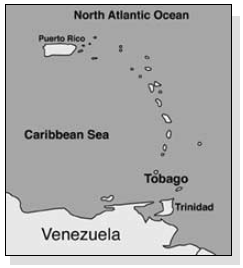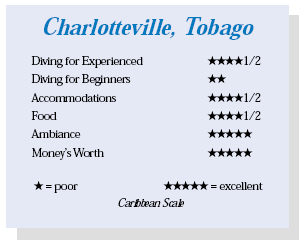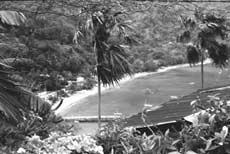Tobago, West IndiesContents of this Issue: That Sinking Feeling: What dope came up with those scuba warnings? What Divers are Roughest on the Reef? Bad news for coral: fecal bacteria is the killer Editorial Office: Ben Davison Publisher and Editor Undercurrent 3020 Bridgeway, Suite 102 Sausalito, CA 94965 liming, wining, but no faffing from the July, 2002 issue of Undercurrent
Dear Fellow Diver, When I first set my eyes upon Charlotteville, at the tip of Tobago (which, with its sister island Trinidad, is at the edge of the Caribbean, off the northeast coast of Venezuela), I vowed to myself to return to spend a winter. I’d rent a beach cottage and each night walk along the water’s edge to have dinner in one of the tiny restaurants. I’d dive with the operator just a coconut throw away, or perhaps head over the hill to the Blue Waters Inn for some good diving. And, I’d spend my afternoons either hanging with locals or doing nothing, for there is no more friendly and picturesque spot in the Caribbean. And believe me, I’ve seen plenty of fine places. Trouble is, I’ve yet to make it. So, when one of our fearless correspondents returned after liming for the month of May, I jumped on her story. -- Ben Davison If there is any Robinson Crusoe in you, then Tobago is the place and Charlotteville is the town. I was itching to tell divers about this “best kept secret of the Caribbean,” but I was fearful about changing it. Thankfully, a woman from Trinidad owns most of the land around Charlotteville. She doesn’t want it to change either, so she won’t be selling land to the wrong people... and we know who they are. Charlotteville is a picturesque little fishing village
on a crescent bay facing the blue Caribbean. You won’t
find a bank or even an ATM. Off to one side is a long
stretch of beautiful beach, with a few cottages and homes
nestled among the palms. I stayed at the Greencorner Villa,
where for $20 a night I had a clean room (sheets changed
once a week) with a fan and double bed, wardrobe and desk, a half dozen steps from the sea! I awoke every
morning (once the cockerels had shut up) to the
sound of waves lapping gently at the shore. In front of the guesthouse I could see scattered coral heads and colorful fish in calm waters, but for serious snorkeling I strolled over the hill, enjoying fantastic views over Man-O’-War Bay. In less than ten minutes I reached 165 steps that led down to Pirate’s Bay, an unspoiled cove with a sandy beach. Snorkeling was superb: huge angelfish, parrot fish, scorpion fish, porcupine fish, red-lipped blennies, squid, and a resident barracuda, which followed me around whenever I went in. I took off my jewelry and he stopped bugging me! Almost every day I free dived with a resident turtle, only a baby. Just me and him. Charlotteville diving is on the Caribbean side, but with the Atlantic dive sites (and the village of Speyside) a 15-minute boat ride away, there’s a huge choice of sites. Charlotteville has two dive operators: Man Friday and Ron’s Diving and Watersports, both of whom I e-mailed before I left home. Bjorn, owner of Man Friday, seemed to have a slick and wellrun operation, but Ron offered me a better deal. ($30 per dive, cheaper if you book six or more dives.) Man Friday runs courses and dive trips year round. Ron is a local, based in Trinidad, who comes to Charlotteville two weeks every month. He keeps a compressor and equipment in a shed on the bay. His pirogue (a traditional fishing boat) is welladapted for divers. The best part about diving with Ron was that there was no faffing around in a dive shop waiting to go . . . it was just meet on the pier at 9:30, get on the boat (the aluminum tanks were there, always filled to 3000 psi) and go! On the way, Ron, who was professional, fun and safety conscious, briefed us, estimated dive time and called for a final buddy check. Then, down, down and away! Dives around Charlotteville were mainly one-tank dives, but on trips to Speyside, we did a morning dive, stopped for lunch in the rooftop restaurant, and then had an afternoon dive, returning in time for a spectacular sunset. My first dive was in Pirate’s Bay, where I was happy to warm up after being out of the water for six months. Ron had two students with him. The dive boats can’t hold many divers so you are almost guaranteed uncrowded diving -- what a relief after diving in Sharm El Shiekh in the Red Sea where on any one dive I saw more divers than fish -- and that’s not to say there weren’t lots of fish. After a backward roll into the clear and calm sea, I dropped to 30 feet and moved between small, rocky pinnancles and canyons, along a sandy bottom that sloped gently away. An impossible amount of marine life went about its business. Here were barracuda, large angelfish, parrotfish, big eyes, two white spotted morays and a big lobster, but not the little turtle I snorkeled with daily. Well after an hour, I emerged a happy diver, ready to rock and roll. On most dives, visibility ran 50-70 feet. Sister’s rocks are three huge, depth-defying pinnacles and an awesome series of underwater canyons, slopes and drop offs, and here hammerhead sharks poke around. I got within 30 feet of two six-footers, who checked me out, and as quickly as they had appeared, they were gone. I hit about 130 feet, with a total bottom time of 50 minutes. At London Bridge, I backrolled in and headed down immediately. The largest of three rocks has an archway through the middle in 40 feet of water, where I queued up to ride the surge through to the other side. While the depth is 110 feet, most of the dive was at 60 feet, where moray, lobsters and a little octopus hid in the rocky folds and crevices. I did some fine drift dives. Perhaps the best was “Kamikaze Cut,” about as
close as I’ve been to feeling like Super Woman. After a backroll in, the current
took hold, gently edging me along the reef. As the current stiffened, there was no going back to see whatever I passed --
angelfish, triggerfish, porcupine fish, a
turtle wedged into an opening in the rock.
My last dive had to be one of the best I’ve ever done, which includes getting wet in Kota Kinabalu, a private island near Sipadan, Thailand’s Koh Tao. This end of Tobago is known for its manta rays, but sightings had been few recently and the consensus was that they had moved on .... perhaps, as some said, because there were too many people riding them and they had had enough. However, I had it on good authority that a diver in Speyside named Redman knew where the mantas were. I sought him out and persuaded him to take me to them. We dived the Bookends and the moment I put my head in the water, I knew it would be a good dive. Viz was spectacular -- 100 feet, perhaps 130 -- and I felt like I was floating in air! The dive started at 60 feet and I quickly came to an open cavern with a fantastic amount of marine life nestled in secret nooks and crannies. Huge tarpon and a school of barracuda swam about and I encountered an enormous porcupine fish. Beyond, the dive became a gentle drift, taking me past spectacular Elkhorn coral, brain coral, colorful soft corals, along with barrel, tube and finger sponges in bright reds, oranges, greens, and blues. A majestic green moray eel swam out of the blue straight for me. Many lobsters were wedged into the rocks, so I took care of dinner for the evening! But, alas, no mantas. Dolphins must have heard the boat engine and jumped playfully at the bow of the boat as we headed back! Charlotteville, a very mellow place, has some tiny bars for a cold beer after
a day in the sun (favorite local beer includes Stag -- a “man’s beer” -- and Carib
... you can get Heineken too). As a single female traveling alone, I got a lot of
attention at first, but it wasn’t the in-your-face sort. As long as I was polite
but firm, the young fellows were respectful. I met plenty of wonderful, colorful
people and became good friends with several. In such a small town, where everyone
knows everyone else’s business, people love to gossip. Village life centers around the pier and “playing field,” where there is a football (i.e., soccer) match almost every day at 4:00 p.m. The whole village would be out to watch, rain or shine, cheering on their team. While there was plenty of sun, it did rain occasionally. Enjoying a shower in warm torrential rain is not to be missed! I spent evenings “liming” (hanging out) on the pier, a beer in hand, chatting with everyone walking past, listening to reggae and lots and lots of laughter. Friday night the younger generation walks down the beach to the Banana Boat, where they put on the latest reggae and the kids “wine” the night away (wining consists of getting as close as possible to your dancing partner and grinding together to the beat of the music!). Eating out is a culinary delight. No menus -- just eat whatever the special was that night. Fish, chicken, beef with a side order of callalou -- wonderful spinach-like soup, perhaps lentils, and delicious breadfruit salad -- a bit like potato but better! I did, however, steer clear of the chicken foot soup. The tiny restaurants have half a dozen tables named after their proprietors: Gails, Sharon and Phebe’s, and Jane’s, where you can buy a roti (a kind of pancake filled with beef, chicken or veg). Gail doesn’t have a license so you get drinks somewhere else, e.g., Lyda’s Bar, a step away, where Lyda herself, a big, happy, friendly local woman, pours. You can get a cappuccino or fresh fruit juice and a pizza from the “Cappuccino Bar.” I cooked a lot, because I couldn’t resist buying the day’s catch from the little fish market. It’s next to the gas station that has two pumps and a sign saying “no gas” for most of the week! I bought fresh local vegetables from stalls scattered along the bay. Often, I would buy freshly baked banana bread or tuna pasties from local women selling on the beach. I tried my hand at fishing one day, landing five kingfish and seven tuna -- a good catch, I later found out. Sometimes you come back with nothing. One tuna provided enough tuna steaks to last for days! I often walked two hours to Hermitage, a sleepy village along the coast, far from anything. Or I took a 30-minute walk to Campbleton Beach, a deserted private cove with a little waterfall behind it, perfect for a fresh water shower, au naturel. Occasionally, after dark, I would take a flashlight and walk toward Pirate’s Bay where two stone benches were stuck into the hillside. I spent hours here, contentedly stargazing and making wishes on the frequent shooting stars. On a good night there wasn’t a patch of sky that wasn’t twinkling. Charlotteville is surrounded by rain forest, and plenty of people offer tours and hikes past waterfalls trickling, snakes sliding (a black snake to be precise, which I nearly stepped on), birds singing, frogs croaking, insects buzzing! Your guide can arrange tailor-made tours and you can take it at your own pace. I chose an easy walk, which lasted a couple of hours. There are plenty of uphill workouts, as well. As you might gather, after four weeks there, I was smitten. The diving, the people, the music, the serenity and just the whole vibe of the place. I can’t imagine a more unique and rewarding Caribbean dive trip, where you can live unpretentiously and so close to nature. -- L.D. |

I want to get all the stories! Tell me how I can become an Undercurrent Online Member and get online access to all the articles of Undercurrent as well as thousands of first hand reports on dive operations world-wide
| Home | Online Members Area | My Account |
Login
|
Join
|
| Travel Index |
Dive Resort & Liveaboard Reviews
|
Featured Reports
|
Recent
Issues
|
Back Issues
|
|
Dive Gear
Index
|
Health/Safety Index
|
Environment & Misc.
Index
|
Seasonal Planner
|
Blogs
|
Free Articles
|
Book Picks
|
News
|
|
Special Offers
|
RSS
|
FAQ
|
About Us
|
Contact Us
|
Links
|
3020 Bridgeway, Ste 102, Sausalito, Ca 94965
All rights reserved.

 Owned
by a friendly local woman named Patsy Christmas,
the guesthouse has two double bedrooms with a
shared bathroom upstairs. Downstairs is an
ensuite double bedroom and a well-equipped
kitchen and a small lounge where I relaxed after
diving. While I liked my bargain quarters, a
more upscale and private choice would be the Man-
O’-War Bay cottages, which sit along a majestic
beach on a 1000-acre cocoa plantation. They run
from $60 for one bedroom to $135 for four bedrooms,
and are just a short walk to the dive
operations and Charlotteville.
Owned
by a friendly local woman named Patsy Christmas,
the guesthouse has two double bedrooms with a
shared bathroom upstairs. Downstairs is an
ensuite double bedroom and a well-equipped
kitchen and a small lounge where I relaxed after
diving. While I liked my bargain quarters, a
more upscale and private choice would be the Man-
O’-War Bay cottages, which sit along a majestic
beach on a 1000-acre cocoa plantation. They run
from $60 for one bedroom to $135 for four bedrooms,
and are just a short walk to the dive
operations and Charlotteville. I held my arms in the superwoman pose,
flying along, then I was sent screaming
through an opening between two rock faces
and deposited calmly on the other side.
Ron always had a safety float strapped to
him and I did my safety stop hanging in
the water. The less confident held the
line. Nights, the boatman followed our
bubbles and was always there with a helping
hand as soon as we surfaced.
I held my arms in the superwoman pose,
flying along, then I was sent screaming
through an opening between two rock faces
and deposited calmly on the other side.
Ron always had a safety float strapped to
him and I did my safety stop hanging in
the water. The less confident held the
line. Nights, the boatman followed our
bubbles and was always there with a helping
hand as soon as we surfaced. There were few tourists, not
more than a dozen a day — an Italian
traveling alone, a group of Danish
girls, a Dane and a Brit there for
months, a few Germans occasionally,
and European boat captains mooring in
the bay. We tourists would sometimes
get together and barbecue on the
beach or cook for each other.
There were few tourists, not
more than a dozen a day — an Italian
traveling alone, a group of Danish
girls, a Dane and a Brit there for
months, a few Germans occasionally,
and European boat captains mooring in
the bay. We tourists would sometimes
get together and barbecue on the
beach or cook for each other. Divers Compass: I contacted Ron through the website
Divers Compass: I contacted Ron through the website